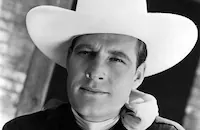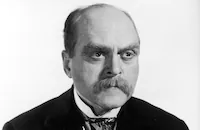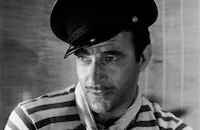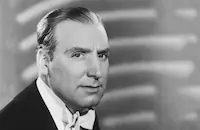Our Betters

Brief Synopsis
Cast & Crew
George Cukor
Constance Bennett
Violet Kemble-cooper
Phoebe Foster
Charles Starrett
Grant Mitchell
Film Details
Technical Specs

Synopsis
Soon after her wedding, American hardware heiress Pearl Saunders discovers that her groom, Lord George Grayston, has married her only for her money and intends to continue his relationship with his noble but poor girl friend. Although crushed, Pearl remains married and, after five years of determined, calculated socializing, gains acceptance by England's most particular aristocrats. She is also adored by her own circle of rich ex-patriate Americans, who include Minnie, a divorced duchess, the gossip-loving Thornton Clay, Flora, a sincere philanthropic princess, and Arthur Fenwick, her doting, older lover and benefactor. Pearl introduces her younger sister Bessie to English society and encourages her to pursue a relationship with Lord Harry Bleane. Bessie, who is loved by the unassuming American Fleming Harvey, hesitates to accept Harry's proposals but is overwhelmed by the excitement of British high society and happily joins her sister for a weekend party at the Grayston country estate. There, Pearl is wooed by Minnie's gigolo, the lazy, faithless Pepi D'Costa, and is seen by Minnie slipping away for a rendezvous with him. Outraged, Minnie plots to have Bessie catch Pearl with Pepi, and the still innocent Bessie, who has finally accepted Harry's proposal at Pearl's urging, is stunned by her discovery. Exposed in front of her guests, Pearl retreats to her room, while a furious Minnie plans her immediate departure for London. To avoid the gossip and ridicule of the society that she has so painstakingly cultivated, Pearl plots to keep Minnie in the country and, using her versatile charms, re-ingratiates herself with the rest of her company. When Bessie denounces her as a hypocritical manipulator, however, Pearl has a moment of self-doubt and, to save Bessie, begs Harry to break his engagement. After Bessie reunites with the devoted Fleming, Pearl returns to her social "throne" and, with the help of Ernest, a foppish dance instructor that she has brought in from London, convinces the dance-crazy Minnie to stay another night to learn the latest tango step.

Director

George Cukor
Cast

Constance Bennett
Violet Kemble-cooper
Phoebe Foster

Charles Starrett

Grant Mitchell

Anita Louise

Gilbert Roland

Minor Watson
Hugh Sinclair

Alan Mowbray
Harold Entwistle
Tyrell Davis
Virginia Howell

Walter Walker
Crew
Tommy Atkins
Hattie Carnegie
George D. Ellis
Hobe Erwin
Harry Wagstaff Gribble
Jack Kitchin
Elsa Maxwell
Jane Murfin
Van Nest Polglase
Charles Rosher
David O. Selznick
Fred Spencer
Max Steiner

Photo Collections
Film Details
Technical Specs

Articles
Our Betters
George Cukor, who worked as a stage manager for an American tryout of the stage version of Our Betters, had met "Willie" Maugham at that time. Ten years later, after the two had established a close friendship, Cukor was assigned by RKO to direct the screen version of Maugham's play. Cukor had followed his friend, producer David O. Selznick, to RKO, as he would later to MGM when Selznick went to that studio at the invitation of his father-in-law, Louis B. Mayer.
Despite their friendship, Selznick demanded that Cukor stick to his ideas of economy and efficiency. After 14 days of work on Our Betters, the director received one of Selznick's infamous memos, advising him that he was four days behind schedule because he had shot 44.6 minutes rather than the optimal 46.4 minutes. Selznick insisted upon an average of 3.2 minutes of usable film per day.
For Our Betters, Selznick engaged Elsa Maxwell, the former cabaret entertainer who had become a gossip columnist and professional party-giver, to advise on the film?s costumes and general tone. Maugham biographer Bryan Connon wrote that Maxwell "claimed to be a dear friend of Willie, but he regarded her as unutterably vulgar, though he thought of her as a useful bridge player." Maxwell could hardly have endeared herself to Maugham and Cukor, both homosexual, with her stated view that she "loathed" most gay men even though she often admired their literary and artistic accomplishments. In her autobiography, I Married the World, she took three pages to explain her views, declaring that there should be one rule for homosexuals who were "rich in mind" and social ostracism for all others.
A final bit of trivia: The cast of Our Betters includes Charles Starrett, later to gain fame as "The Durango Kid" in B-Westerns and serials.
Producer: David O. Selznick
Director: George Cukor
Screenplay: Harry Wagstaff Gribble, Jane Murfin, from W. Somerset Maugham?s play
Art Direction: Van Nest Polglase
Cinematography: Charles Rosher
Costume Design: Hattie Carnegie
Editing: Jack Kitchin
Original Music: Bernhard Kaun, Roy Webb (both uncredited)
Cast: Constance Bennett (Lady Pearl Saunders Grayston), Violet Kemble-Cooper (Duchess Minnie), Phoebe Foster (Princess Flora), Charles Starrett (Fleming Harvey), Grant Mitchell (Thornton Clay), Anita Louise (Elizabeth "Bessie" Saunders), Gilbert Roland (Pepi D'Costa).
BW-84m.
By Roger Fristoe

Our Betters
Quotes
Trivia
Notes
W. Somerset Maugham's name appears above the title in the onscreen opening credits. According to a Film Daily news item, Anthony Jowitt was also in the cast, but his participation in the final film has not been confirmed. A Hollywood Reporter pre-production news item noted that Ralph Forbes was replacing Hugh Sinclair in the cast, but Sinclair, not Forbes, is listed in the onscreen credits. Modern sources add Finis Barton to the cast.















